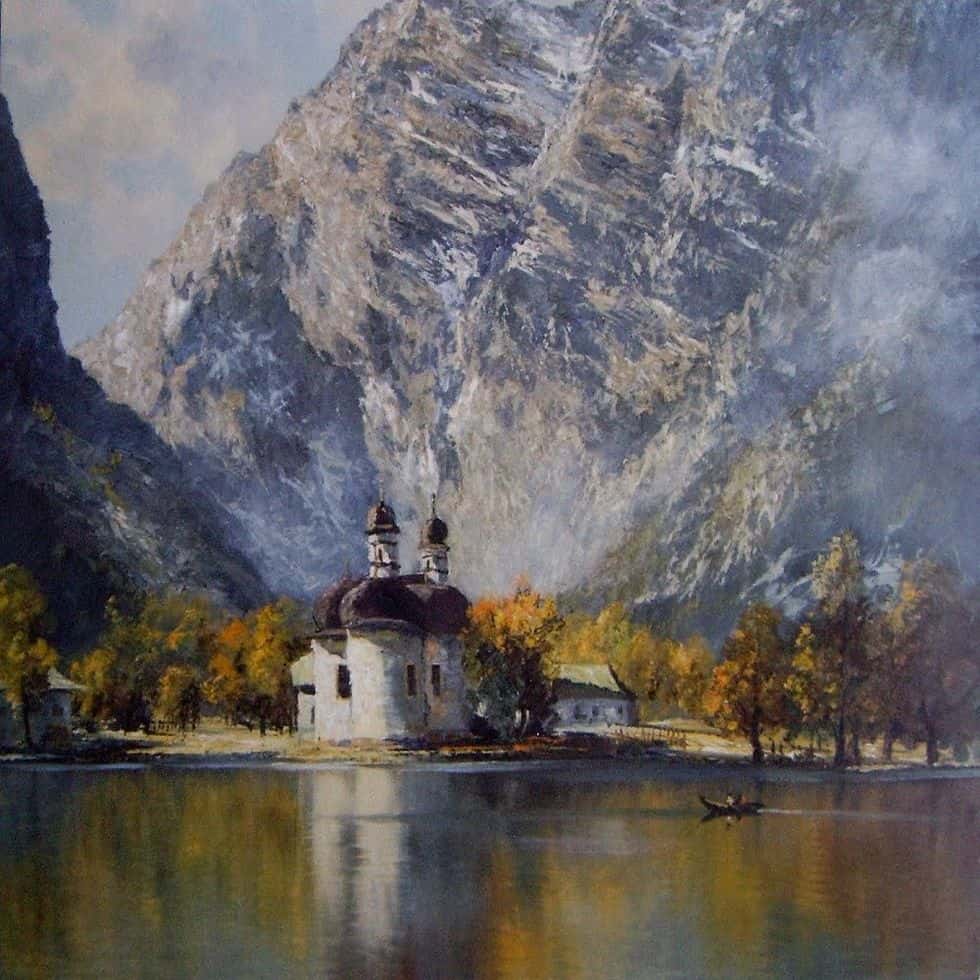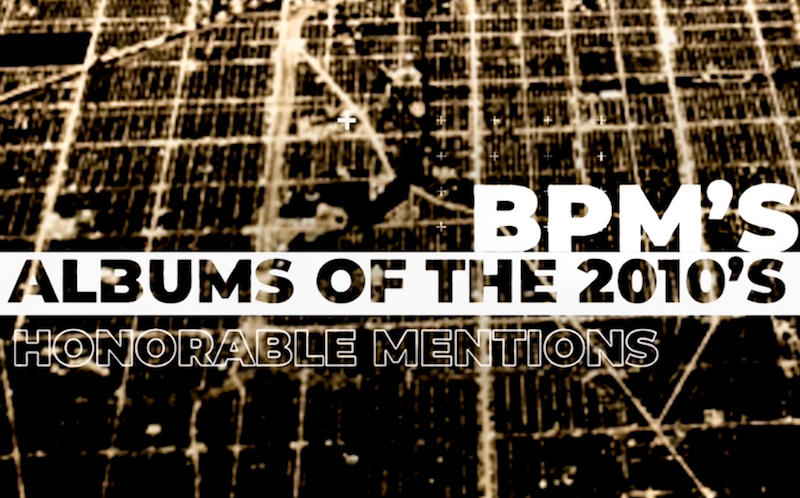Listen to a Spotify playlist of our favorite songs from our Honorable Mentions

Los Campesinos! – Romance Is Boring
[Wichita/Arts & Crafts; 2010]
Released just a few weeks into the decade, Romance is Boring was a sure sign that Los Campesinos! would remain a going concern for quite some time. Following two albums of scrappy DIY indie-twee bangers, the Cardiff-originating rabble set off to America to record their third album, which would become their opus. It seems the grandiosity of the 50 states inspired Los Camp to go bigger and bolder, and at 15 tracks over three clear acts, it’s their most ambitious album to date.
It also features a host of their most beloved, quotable and scathing songs. “I can very clearly see that I was a bit of an arsehole,” Gareth Campesinos admitted when I interviewed him and Los Camp’s musical mastermind Tom for Romance is Boring’s 10th anniversary. However, as he saliently pointed out, the joke is almost always on him: “I can’t think of many examples where it’s been the person that I’ve been singing about that has come out of the situation looking worse than me.”
It’s this knowing, self-aware character that keeps us coming back to Los Campesinos!, and on Romance is Boring they loaded it in the barrel alongside a host of newly ambitious instrumentation, which, when fired, resulted in scabrous and scrappy takes on templates set by American greats like Pavement, Death Cab and Deerhoof.
But, of course, it’s the inherent British frankness that makes it so replayable. Whether it’s the pompous title track (“I am a pleasure cruise, you a direct-to-trawl”), the bitter protagonist of “We’ve Got Your Back” (“I’ve learned more from toilet walls than I’ve learned from these words of yours”) or the disappointed philanderer of “Straight in at 101” (“I think we need more post-coital and less post-rock”), there is a carnal glee in vicariously living as these omnivorously horny people through Los Camp’s music.
But there’s also a true heart beneath it that makes those songs beat with vitality, and when it shines through earnestly, it’s unbearably bittersweet. This is evidenced in the jilted and jealous lover of “I Just Sighed…” (“Please, just let me be the one to keep track of the freckles and the moles on your back”), the romantic who tries to tempt a girl away from God (“It pains me, but I’m sure she’s still yours”), and – most starkly – on the tale of love, death, and desperation that is the elegiac “The Sea Is A Good Place To Think of the Future” – perhaps still their most impressive and impactful song to date.
In the last decade, Los Campesinos! have gone on to release several more great albums packed with more pristinely arranged and produced songs, but Romance is Boring stands apart. Now, the band is almost like a part time job to the members, who all have day jobs. Never again will they have the time and focus to dedicate solely to writing and recording music.
They’ll also never be that young and heedless again, with Gareth willing and able to put his dirty laundry on display without care. Romance is Boring was, and remains, a beacon of solace and companionship for all of us who have memories of immature love that still make us cringe when we recall them. – Rob Hakimian

Lost In The Trees – A Church That Fits Our Needs
[ANTI-; 2012]
Ari Picker’s now-defunct band Lost in the Trees never got the visibility or reception they deserved. Releasing three albums of ornate, orchestral chamber pop, Picker and co. just never broke through, in a scene that, at the turn of the decade, was rather busy with bands of this genre.
Still, their second record, 2014’s A Church that Fits Our Needs, is worthy of any Best of the Decade list. Documenting his journey through the grief of losing his mother (who graces the cover), Picker writes tender, impossibly detailed songs lamenting her passing while also celebrating her life.
Some of the melodies sound like Disney in The Upside Down; just enough of an uneasiness to stop them from being cloying. And Picker’s voice, a creaky and emotive instrument, guides us throughout. Little details can be found across the album that keep it truly of a piece — look out for Picker happily mentioning his unborn twins on “Red”, only to tell us on song later on “Golden Eyelids” that they were born “far too early”. And watch out for Emma Nadeau’s operatic backing vocal on the fragile tearjerker “This Dead Bird is Beautiful”, perhaps acting as a stand-in for Picker’s late mother.
A few years before Sufjan Stevens’ heartbreaking Carrie & Lowell detailed the loss of his mother, Picker’s A Church That Fits Our Needs was operating at a more bombastic but no less emotional level. It’s richly textured, finely tuned, and almost unbearably melancholy, but a beautiful album nonetheless, worth the trek into the woods. – Jeremy J. Fisette

MONEY – Suicide Songs
[Bella Union; 2016]
Let’s face it: this album has both a title and cover that are quite off-putting. This is pretty much the only reason why I can think that Suicide Songs didn’t do for MONEY what Urban Hymns did for The Verve. And that’s a damn shame, because these are elegiac anthems that should be sung by enormous festival crowds.
Despite how it might appear, Suicide Songs is not a hopeless record. There’s hopelessness in it, certainly, but that only becomes clear because of just how much hope there is in the majority, particularly in Jamie Lee’s potent words and pained howl. He may vacillate from proclaiming “I am the Lord” in the opening track to repeating “I’m not here” on the following, but these sentiments are perfectly-judged in their delivery, allowing us to feel the extreme pleasure and pain in both.
Via acoustic watercolour torch songs to crestfallen epics, we get to step inside the singer’s mind and experience his hyper-romantic worldview firsthand throughout Suicide Songs, and it’s a deeply honest ride. As he sings on the – actually very uplifting – title track, those of who really experience the world earnestly have a tendency to get melodramatic and downcast: “I know some of us need to turn the light into dark / It’s remarkable that some of us can’t.”
However, Lee is also an expert at going from dark to light. It’s this silvery grey area where songs like “Hopeless World” and “I’ll Be The Night” exist, like beautiful dreams being sung by someone that has lived their life in the shadows.
It’s this fine balance between hope and hopelessness, teased out with soaring and vivid string arrangements, that makes Suicide Songs a truly potent and poignant listen from start to finish. It’ll drop you in a hole then lift you back out with angel’s wings, and it should be experienced by all. – Rob Hakimian

Pantha Du Prince – Black Noise
[Rough Trade; 2010]
Natural splendor is like no other. To be aghast at the intimidating grandness of a mountain, quieted by the stillness of a gleaming lake, or moved to pause by the underlying bustle of the natural world happening around you is like nothing else. To capture that feeling in music is another task in itself, an arguably fruitless endeavor that will always fall short. But then you hear an album like Black Noise.
Pantha Du Prince‘s third album seems so attuned with the surrounding world (namely the Swiss Alps, where Hendrik Weber took a vacation and captured field recordings on location). Sometimes it feels like you’re hearing the chatter between trees, ice crystals materializing, or thunderclouds forming. With his signature chimes on hand throughout, Weber makes crystalline music here that feels formed from nature itself.
And not just that: Black Noise also grinds and grooves so fucking well. The album’s tight and stunning mid-section is full of pinnacles of airy ambient and techno. “A Nomad’s Retreat” is luxuriously feverish with movement from the bassline alone, while “Satellite Snyper” sleekly morphs into a lucid EDM dream, drum and click tracks percolating underneath a glistening, glacial, and unforgettable melody.
Come the album’s more wooden-sounding back section, the ambiance filters in more until it sounds like you’re caught in a full-on snowstorm between “Im Bann” and “Es Schneit”, haunting voices lost somewhere in the chilling white mist before your eyes. This is nature meeting music somewhere undefinable in the middle. The exact location doesn’t matter though, because when Weber’s music slowly starts swallowing your ears on opening track “Lay In A Shimmer” all you know is that there’s nowhere else you’d rather be. – Ray Finlayson

PJ Harvey – Let England Shake
[Island; 2011]
It isn’t to be taken lightly that PJ Harvey released one of her best albums in 2011, 20 years and eight albums deep into her career. Let England Shake is easily the best record she had released since 1995’s seminal To Bring You My Love.
Borne by a deep interest in the war history of England, especially WWI, the album found Harvey in storyteller mode, which wasn’t exactly new for her – never forget that some people thought she had actually drowned a baby after she put out “Down by the Water” – but what she was singing about felt new, rawer than before. There are no stories of love or heartbreak here, except for that between brethren on the battlefield, parents whose children are lost to war, or the ghosts of soldiers longing for life.
The poetic weight Harvey displayed here was impressive, crafting some of her most powerful lyrics yet. Details like “mountains jutting out / cracked like teeth in a rotten mouth” are gruesome and instantly tangible; others like “I’ve seen soldiers fall like lumps of meat” are blunt to the point of being wince-inducing. Other times, she is impossibly melancholic and wistful, like on “Hanging in the Wire”. She samples a couple of times throughout the album too, like on “Written on the Forehead”, which improbably features Niney the Observer’s “Blood and Fire” to shockingly good effect, and “This Glorious Land” features a just-out-of-tempo traditional war bugle call.
It’s a jarring album at times, but never needlessly so. Every word and sound has purpose, the music feeling at once modern and also deeply out of time, almost out of space. Her melodies are direct and surprisingly catchy for such dark subject matter, and her songs never feel judgmental here (as some argue they did on her followup record, The Hope Six Demolition Project). By depicting the history of war in her home country, Harvey ended up crafting a ‘war album’ in the same sense that filmmakers have long been making ‘war films’; it shows us some harsh realities, it’s gritty and moving, and asks us to try and make sense of it all. The trick is, of course, nobody can. – Jeremy J. Fisette

Priests – Nothing Feels Natural
[Sister Polygon; 2017]
2010s punk didn’t get much better than Priests in my book. For a good many years they were my go-to band for thrills and chills. Lead singer Katie Alice Greer has a chameleonic voice, able to summon hellfire from her abdomen, but also float angelically on a cloud of golden harps. A truly versatile vocalist, she can throw us back to the 80s NYC scene with nods to Kim Gordon then hop over the big blue for some Siouxsie homage, all evidenced on their underappreciated sophomore album The Seduction of Kansas.
The world was deprived of a very important punk band in December 2019 when they announced their hiatus, and while they hadn’t achieved a wide reach, the material produced is of no other kind. Greer stalks her crowd when she performs, exploring mannerisms of a cheetah or puma, then screeches in your face, all while dressed like a ballerina with smeared eye-liner. The D.C. punk scene is where they started, but 2017’s Nothing Feels Natural brought them some national attention thanks to strong showings like the surf-rock tinged “JJ” and sarcastic and deranged cheerleader feel of “Pink White House”.
Priests were unique to the breed of punk, in that they resumed the old school motivation that commercial punk wasn’t really about anymore. A conscious lyricist at heart, while Greer took shots at politicians on both sides of the ballot, Nothing Feels Natural is the perfect time capsule for the post-2016 election. A week before the album’s release, on the day Donald Trump’s inauguration, Greer took to the streets of D.C. to perform for the awesomely-titled event they helped organize – NO THANKS: A Night of Anti-Fascist Sound Resistance in the Capital of the USA.
Music is the language of resistance for punk, and Priests spoke it fluently. One day, I hope, they come back, but for now Nothing Feels Natural will be the record I spin when I’m so fed up with the way the world is regressing, not because I want to feel worse, but because it can move people to invoke change. – Tim Sentz

Protomartyr – Relatives in Descent
[Domino; 2017]
A complex and riveting work, Protomartyr‘s Relatives in Descent is a masterpiece of jagged rhythms and sharp irony. Everything about it, from the stark pink cover to its thematic bookends about a half-sister that desperately tries to reach the narrator’s opposite, is political, evocative, iconic.
At times resembling a sharper Interpol or a focused Scratch Acid, the 12 songs capture the United States as dysfunctional wonderland, as vocalist Joe Casey finds eternal images for the dastardly state of affairs. Among other things, the protagonists are: Elvis, gazing at a cloud that resembles Josef Stalin, a set of privileged corpses in fancy clothes that drink from bottles named after byzantine kings, a horse that learnt to talk, a hidden flower that only blooms at night and becomes refuge space for outsiders.
There’s an overarching necromantic theme here – both metaphorically and figuratively. The zombies in “Corpses in Regalia” are no different from the angry mob who storms an aristocratic tower, only to lose themselves in the gaze from the window – and then fall out of it. The speaking horse is shot and stuffed, so the kids can learn of its mistake to never shut up. “Gross gold runs headlong to the boar” muses Casey, as he likens himself to the weeping philosopher Heraclitus the Obscure. To him, masculinity is doomed to see their sanity and bodies fail (“Male Plague”) and America is home to corporate towns that breed has-beens and unhappy hustlers. And there will not be any change within the capitalist, consumerist society that feeds off the working class: “the river doesn’t move / It doesn’t flow / It’s been leaded by snider men to make a profit from the poor”. At the end of it, Elvis is dead on a bathroom floor, while somewhere, on the other end of a phone line, somebody’s sister is trying to reach them. – John Wohlmacher

Real Estate – Days
[Domino; 2011]
When children build modern cities of Lego, they always imagine urban scenery: restaurants filled with visitors; police and fire stations filled with busy obligations; hospitals where everything can be cured. But then, when these children grow up, the cities in their minds take on different forms. They think of autumn leaves on green lawns, of drinking soda while golden rays of sunshine turn the neighborhood into a land of opportunity – maybe they remember their long-gone companion pet next to them, or a friend whose sweater pattern they memorized.
It’s that idyllic memory of autumnal suburban bliss that Real Estate encapsulated perfectly on Days. Here, “the houses were humming” and “the phone lines / the street lights / led me to you”. Beauty is found in the mundane, in the everyday, and within companionship that ultimately goes out of tune and fades like old photographs.
At times, the album sounds like a slowed down version of The Strokes’ Is This It?, other times like the pastoral dark hippie hymns of Crosby, Stills, Nash & Young. In the context of its time, it’s closer to the nostalgic and hypnagogic, to Deerhunter and Toro Y Moi.
Listening to it 10 years down the road, it in turn conjures images of an era long gone by, of lemon beer and falling snow, warm beach sand and sweat on lips. A vintage piece of clothing, it has weathered the storm and still smells of the best times, its future in the hands of whoever will pick it up and put it on. – John Wohlmacher

Swans – The Glowing Man
[Young God/Mute; 2016]
There is no good way to start talking about a band like Swans. The multiple incarnations and styles the act have been through in their nearly long career leaves them with a back catalogue of impressive variety. The irreplaceable frontman Michael Gira is perhaps among the most enigmatic musicians and songwriters living and creating nowadays. Swans gained a cult following for their music’s visceral feeling. In the late 90s the band went out on the high note of releasing perhaps two of their most influential and fan-favorite records The Great Annihilator and Soundtracks for the Blind.
However, they returned in 2010 with a new purpose. This incarnation sees the band continuing from where they left off, focusing on spaciousness, abstractness, and purity Starting from the 2010 ‘s My Father Will Guide Me Up a Rope to the Sky, Swans began revving their creative engine once again and with the following The Seer brought their machine to a near-explosion state to only then blast off with the modern classic To Be Kind.
If To Be Kind is the epic, breathtaking, and awe-inspiring take off, then The Glowing Man is the journey to space. The 2016 record feels like the long drive to the most promising place of one’s life. In real life, one cannot skip the trip itself, instead whatever thoughts and emotions come while sitting behind the wheel have to be taken in and processed properly. (Needless to say, The Glowing Man is a great road trip album.)
This record possesses such depth that cannot even be half expressed through merely listing such qualities as the jazz-inspired instrumentals, the droning that takes the listener to an ethereal realm, Gira’s otherworldly and unbelievably powerful vocal delivery, and much more. If there exist records that make the listener doubt that they know what music even is, then The Glowing Man is most certainly among them. – Aleksandr Smirnov

Westside Boogie – Everythings For Sale
[Shady/Interscope; 2019]
Boogie (or WESTSIDE BOOGIE, as he’s rechristened himself) has a lyrical ability to cut right to the emotional core of a moment. The seemingly eternally underrated Compton rapper has garnered recognition from just about everyone who matters in his industry – signed by Eminem, had Rihanna declare him her favorite rapper, co-signed by Kendrick, you name it – and yet mainstream notoriety has continued to more or less evade him.
For my money – absolutely no hyperbole here – Everythings for Sale is the most slept on hip hop album of its decade. Something he’d have no patience hearing, by the way – “Don’t let no n***a tell you that you slept on / You better take the blame that you progressed wrong” – yet, the fact remains.
It’s the ultimate soundtrack for the eternally jaded, overly plugged Instagram generation. “I’m tired of working at myself, I wanna be perfect already / I’m tired of the dating process, I wanna know what’s certain already,” he grieves, speaking for just about any one of us under a certain age (or, hell, perhaps even over it). It’s all genuinely nearly too human. He makes every deeply personal thought and revelation feel entirely, inescapably universal. He fantasizes about sleeping with “every Instagram girl in the world” one moment, and plunges into self-loathing the next. If Kanye was the rapper to admit “We all self-conscious”, Boogie has been the one to dig into every inch of insecurity, unreserved.
Every moment is carefully calculated, from the blissed out glide (belying a deep fatigue) of “Silent Ride” to the mournful (and spiteful by turns) unspoken apologies of “Whose Fault”. He even makes good use of a typical late period Eminem verse, slotted right towards the middle of affairs for a jolt of invigoratingly disparate energy. By the time he’s going back and forth with Snoh Aalegra for closer “Time”, we come to the simplest, starkest truth: Everything’s for Sale is music for those of us that want to change, and, ultimately, music that makes us face the inescapable truth that we just might be unable to. – Chase McMullen

